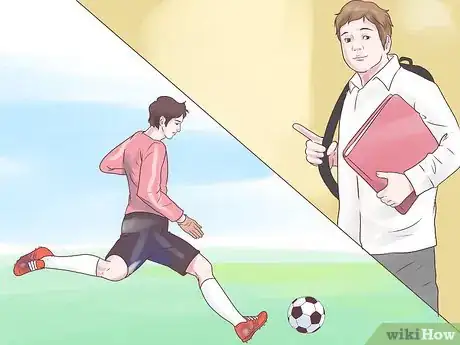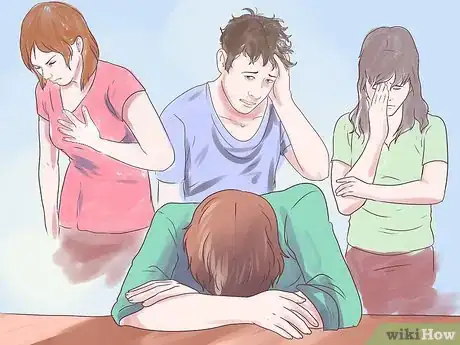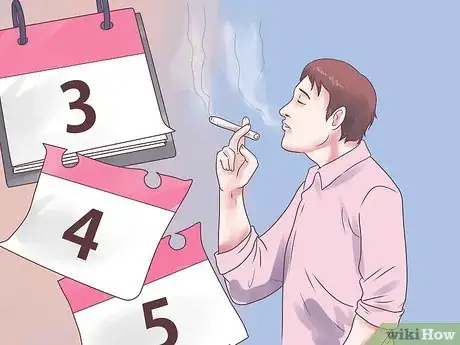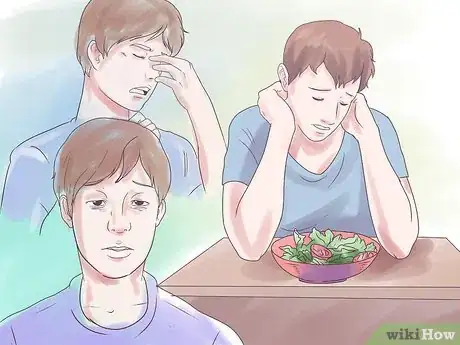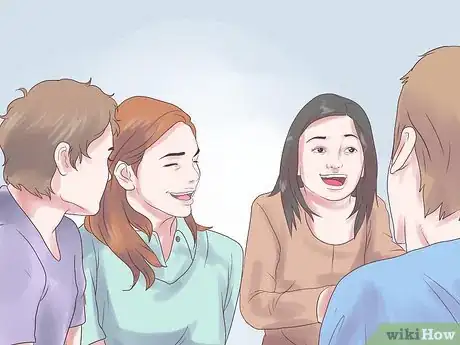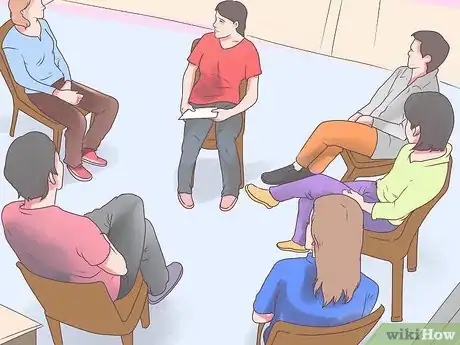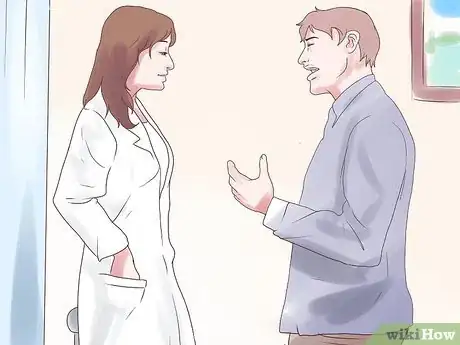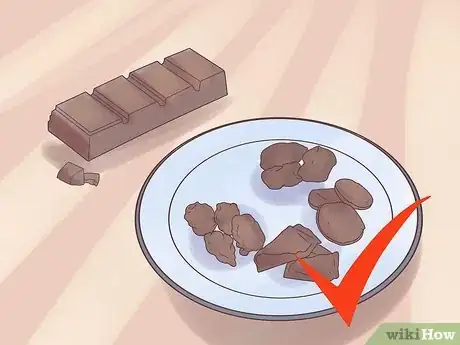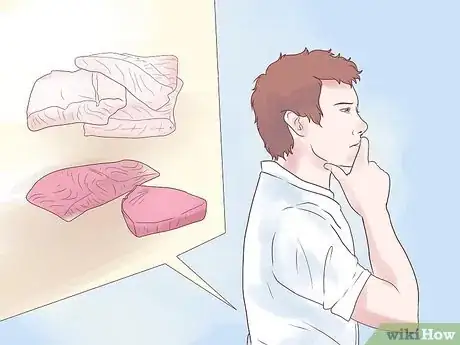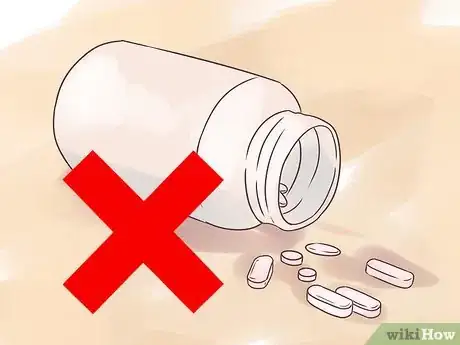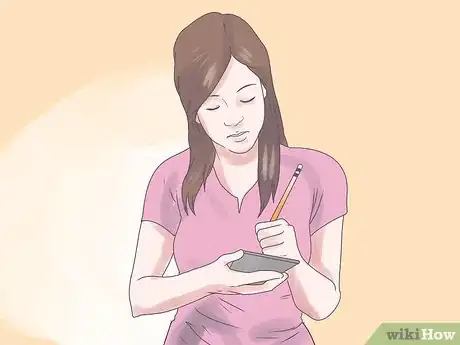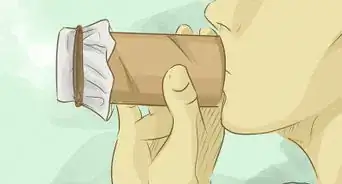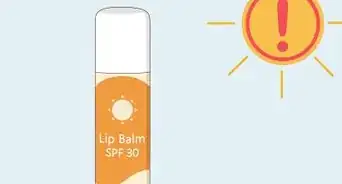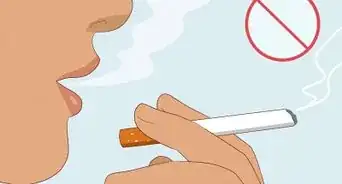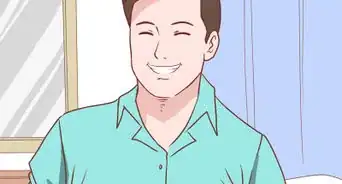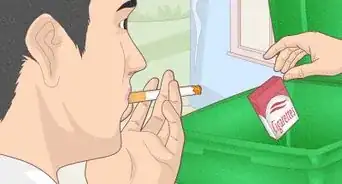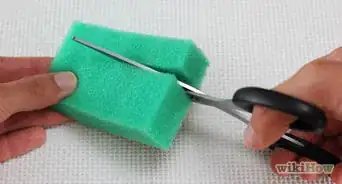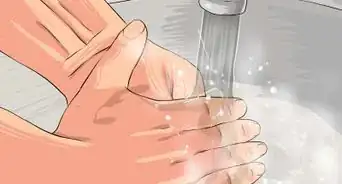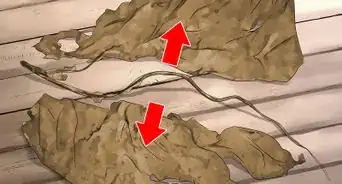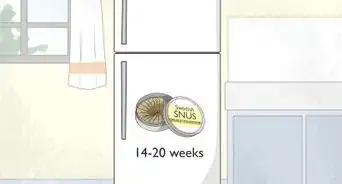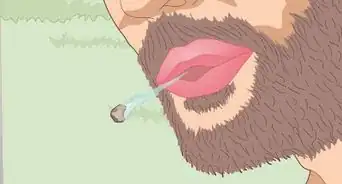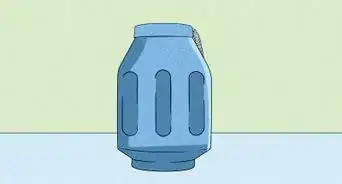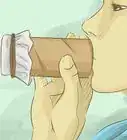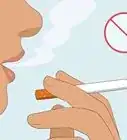This article was co-authored by Natalie Feinblatt, PsyD. Dr. Natalie Feinblatt is a Clinical Psychologist with a private practice based in Los Angeles, California. With over 15 years of experience, Dr. Feinblatt specializes in helping people with addiction, trauma, and other mental health struggles. She holds a BA in Psychology from The University of California, San Diego, and a Master’s degree and Doctor of Psychology (PsyD) from Pepperdine University. Dr. Feinblatt is licensed in the state of California.
There are 16 references cited in this article, which can be found at the bottom of the page.
This article has been viewed 213,999 times.
Though marijuana is less addictive and physically endangering than many illegal substances, it can still very easily turn into a harmful habit, which is difficult to control and causes damage to everyday activities, social interactions and physical abilities. This is especially true for long-term users, who have been smoking for years. If you or somebody you love is one of these people, you should know that quitting marijuana is completely possible and, in fact, much easier than with most other addictive substances -- all starting with Step 1 below.
Things You Should Know
- Prepare for withdrawal symptoms, like headaches, irritability, low appetite, and difficulty sleeping.
- Get support while you kick the habit. Reach out to loved ones, schedule a therapy appointment, or find a support group.
- Focus on your personal health and happiness while you quit. Eat well, exercise regularly, and throw yourself into your passions.
Steps
Deciding
-
1Know how marijuana affects you. Cannabis intake can cause lack of initiative or laziness, an unwillingness to participate in many social situations (especially when interacting with non-smokers is involved). These reasons are why the number of people deciding to quit smoking weed is progressively increasing. How has it changed you?[1]
- Having an addiction does not only destroy one’s physical health, but may make one more prone to psychological disorders like schizophrenia if you have a genetic predisposition.[2]
- Consumption of weed increases the release of serotonin in the body which is a chemical produced in the brain that gives feeling of pleasure. Unfortunately, the longer you smoke weed, the less and less serotonin gets produced, the less "pleased" you feel, and the more you're left with additional cravings.
-
2Have an honest conversation with yourself. Clear a few hours (or even a whole day) of your schedule and find a calm, serene place – settings which you enjoy and where you can be by yourself. Turn off your phone so that you won’t be disturbed or distracted by it and think about your use of marijuana. Some helpful questions to ask yourself are:[3]
- When did you first try marijuana and why did you do it?
- For how long have you been smoking and how often do you do it?
- What do you feel before and after smoking? (Try to especially concentrate on whether you are trying to ease negative thoughts or avoid dealing with problems by smoking.)
- Were there times when you neglected your duties (to yourself, family and friends, school or work) because of smoking?
- Are there activities that you want to take part of or would like to excel at but haven’t done so yet because you were not feeling very motivated?
Advertisement -
3Figure out your motivators. The closer you get to these, the easier it'll be to stop. Once you figure out your motivations to smoke, you can figure out what might motivate you to stop. Come up with corresponding goals -- something that will motivate you to kick the habit. That can be anything ranging from applying to a good college or taking better care of your family through excelling at a sport or a craft.
- If you want to quit smoking cannabis, it is crucial to be certain of your motivators – the stronger they are, the better chances you have.
- Often it is easier to quit one thing by substituting it with another. In this case choose something better, and If you have cravings try chewing a piece of gum (regular or nicotine) or having a drink of water each time that urge surfaces. It can help change the often habitual act of smoking, and at the same time provides you with something healthy to do.
-
4Realize that this decision is final. Most of the people who have an addiction feel that they want to quit every time they smoke. They make a commitment to themselves each time for quitting and then end up doing it again. You need to know that this time your decision is final. In order to heal, the first step is to accept that you have a problem.
- At the same time, don't dwell on the past of your addiction, and focus on how much better you can be (physically and mentally), without getting high. Remember, it is a choice to smoke weed, not an automatic way of life. If you need to, say to your friends, "I can't smoke - it makes me paranoid," "I feel dizzy when I blaze," or "My job has random drug tests," whether they do or do not test. Provide a strong barrier verbally to those who "egg" you on when your excuse is simple, like "No, Im trying to quit."
- In this case, accepting that you have a problem is not just it -- you also need to accept that it is a problem and not a pleasure. Problems need addressing before they get any worse -- which is exactly what you are doing.
-
5Don't blame anything or anyone else. Another essential point is to avoid blaming the substance, other people, or your living situation. To be successful in quitting, you have to try to take responsibility for your own actions – both positive and negative. This will aid you in the process as you will be more likely to praise yourself for success and work harder when things don’t turn out exactly the way you imagined.[4]
- Blaming others will only give you an "easy out" when things are difficult and will make you more likely to start smoking again. Even though the first step of quitting is being honest with yourself, you don’t have to complete the whole process on your own. Some techniques, especially psychological help, can aid your efforts tremendously.
-
6Know the side effects. As much as weed is a great thing to experience, it comes with severe side effects that could last a long, long time. Knowing what could befall you could help clinch your decision. Here are a few effects that you might be facing after long-term addiction:[5]
Quitting
-
1Take it slowly. It is immensely arduous for people to quit who have had drug dependency for a long period of time. Leaving the drug once and for all suddenly will just make the withdrawal symptoms worse and you might lose hope to continue. It is much easier if you initially decide to slow it down and then ultimately leave it completely. Don't try to go cold turkey![8]
- If you have been smoking weed at least twice a day then try limiting yourself to once a day for the next week. This will help the body get used to less serotonin in a much healthier and easy way.
-
2Remember that you want to quit. Quitting an addiction can be difficult beyond belief so you need to keep reminding yourself that you have made a pledge to become finer for your own sake. Write it on a piece of paper or make a sticky note on your phone saying “I want to quit.” Make sure you can always see it.
- There might be times when you would want to break all the chains and light that thing up but then this note will help you to remember the decision that you took for your own benefit.
-
3Remove demotivators from your life. In order to do that, you should get rid of everything that reminds you of marijuana – paraphernalia, posters, music, movies, etc. This is an important step because even if you believe you have solved the problem and are keeping the mentioned above simply as souvenirs, you are more likely to get tempted to start smoking again.
- Picture loving cake while knowing that you should never have it again and yet constantly keeping your favorite kind on the counter, where you can always see it. It is an unnecessary trigger that will only torment you.
- When someone offers you weed (or other drugs), just say "I'm not in the mood" or "I'm having a good time already, thanks." If they push you, you can choose to be honest and say, "Hey, I'm really trying to get sober."[9]
-
4Be prepared for withdrawal effects. This includes irritability, lack of sleep, decreased appetite, fatigue and maybe even some headaches. Luckily, marijuana withdrawal is not that long of a process – it only takes about 10-15 days, depending on factors such as your age, health status and use duration.[10]
- However, it gets more challenging afterwards when you have to keep away from weed for the rest of your life. There are many factors that might trigger your use or could make it very difficult to deal with life without smoking. We'll discuss long-term strength shortly.
Support
-
1Have a strong support system. Make sure you are surrounded by the right kind of people as peer pressure is one of the most influencing sources of getting into drugs.[11] While quitting, be around the friends who have been encouraging you to quit as they will be more understanding towards your situation rather than being with your pot buddies who might attract you towards it again. They might be great people at heart, but having an exposure to drugs while in the process of quitting will make you covet it even more.[12]
- When you think you have accomplished your goal of quitting, you can bond with them again; only if you think you are strong enough to not indulge yourself in the addiction again should this be considered.
-
2Talk to those around you about your decision. You need friends and family who love and understand you. That is why it is essential to talk to your loved ones about your decision to stop smoking. Explain to them that this is difficult for you and you really need their support. Explaining that you are planning to take action and are very serious about your decision will help your loved ones get on board and do their best to support you.
- Even though it is better, at least at first, to stay away from people who use marijuana, you might have some valuable relationships among those people. If that is the case, explain to them that you are not looking to change their behavior (otherwise they might feel attacked and try to talk you out of the decision).
- Let them know what your reasons for quitting are and ask them not to smoke or demonstrate any behavior connected to smoking when they are around you. If they're true friends, they will do as you request.
- Even though it is better, at least at first, to stay away from people who use marijuana, you might have some valuable relationships among those people. If that is the case, explain to them that you are not looking to change their behavior (otherwise they might feel attacked and try to talk you out of the decision).
-
3Seek out a support group. There are a lot support rehabilitation groups that have proven to be great sources of quitting addiction if you think you cannot do it all by yourself. A good rehabilitation centre is a great place to be at. Not only will you be kept accountable, but you'll be surrounded by people that are going through the same thing you are.
- Some people need to be restricted or threatened by authority figures in order to stay balanced. These centres keep a check that you do not start with the addiction again and even helps you get sober with the help of medical and psychological help usually through cognitive behavioral therapy (CBT) as the most important method of treating cannabis use disorders (CUD).
-
4Seek out therapy. Therapy can be very useful with issues like this, due to the fact that it will help you understand your underlying motives for smoking and will let you cope better with trying life-situations which could otherwise bring you back to square one. Appropriately trained and certified therapists can serve as objective onlookers who could show you another point of view which you have not considered before, thus further motivating you to stop smoking marijuana.[13]
- What is more, these professionals have experience with people struggling to quit weed and so will be able to construct a tailor-made approach for your own personality and lifestyle. However, as there are many approaches in psychotherapy and even more therapists, it may sometimes be difficult to pick the most suitable one for your needs. That's what we'll discuss next.
-
5Be aware of the types of therapy that may work. When going into therapy it might be useful to learn a bit more about the most common and successful approaches when it comes to quitting weed. Here's the gist:[14]
- Cognitive behavioral therapy. Cognitive behavioral therapy refers to the belief that your thoughts and actions are very much interconnected; therefore, through changing your negative thoughts you can change your negative behaviors. This approach can be very useful when trying to quit smoking weed, as it will examine the thoughts that provoke your smoking and thus will work on the behavior itself.
- Motivational enhancement therapy. This therapy is especially useful to people who are trying to quit cannabis, alcohol or nicotine. It is based on the fact that people with such problems often realize that their actions are harming them, but are still very comfortable doing what they are doing. Its purpose is to examine your motivation for change in a very positive, non-judgmental and non-confrontational manner. In this therapy you are not told why you should change, but rather are aided to find your own arguments and reasons. The therapist helps you elicit positive statements and empower yourself, so as to strengthen your inner motivation.
-
6Know that there is only the right answer for you. There is no one universally correct approach, when it comes to helping you stop smoking marijuana – every person is different and their motivation for acting a certain way is very specific. That is why the kind of therapy you choose should be appealing to you. If you feel uncomfortable with the approach you are more likely to fight it, even unconsciously, thus reducing your chances for success.
- In addition, your therapist will tailor the approach to your unique personality, thus improving the likelihood of you quitting even further.
- To choose a therapist. consult with your general practitioner. They will recommend some good options within your area. It is essential to remember to be as honest as possible with your therapist because this way you will meet him or her halfway and will aid the success of your own goal.
Routines
-
1Eat more fruits and veggies. A good, healthy diet while quitting does not only help in keeping your hydration level high but it can actually stop the craving of smoking. To fight those urges, load up on these foods:[15]
- Smoking causes the person to have more sweet and artificial flavor cravings. 2-3 apples per day can help in fighting these urges. The crunching also keeps the mouth busy and tired. Bonus!
- Vegetables that are crunchy in texture help in fighting the addiction as well. Vegetables like garlic and ginger leave a taste in your mouth that makes the smoke taste worse. Chop these two into very little and chewable pieces and add them into your everyday food.
-
2Go for more milk and cheese. Utilizing these foods in your diet might help you pass through the withdrawal stages more quickly. They also make you look healthier and better looking than before by helping your hair, skin, and nails. When it comes to dairy, here's what you should know:[16]
- Having a glass of milk one hour before your smoking hours will make your stomach feel filled up; because of this, you will lose the desire to smoke pot. It will also leave a taste in your mouth that no one wants to mix with drugs!
- Cheese is very useful while quitting as it contains the taste of salt which stays in the mouth. But go easy on it if you think you are consuming more than the required amount of fat already.
-
3Get the appropriate amount of fats and sugars, too. While quitting drugs all by yourself, it is necessary to keep your nutrition levels in check as you might feel drained all the time. You still need some pick-me-ups, though! Here's how to get your fix:[17]
- Dark chocolate has always been famous in treating mood disorders and will help you deal with the phases of depression that you might get.
- Dried fruits and potato also help in stopping the cravings.
-
4Get your protein and carbs as well. At the very least, 10% of your diet should be from protein and at the very most, about 1/3 of it from carbs. Here are some good sources:[18]
- Lean white meat, tuna and salmon are known for quitting addictions as it leaves a taste in your mouth that will not be good if amalgamated with the weed.
- When it comes to carbs, go crunchy. They're more sating and come with starch that gives you the energy to keep going with your mission.
-
5Exercise it out. Exercise is a healthy way to take out all the energy that has been lying dormant in your body. It helps you keep your body fit and focuses all your energy at a positive activity. It also helps with the cravings![19]
- Yoga has been known as an exercise to relax the mind and therefore helps during withdrawal as the body sometimes want to just start screaming out loud. You know the feeling.
- Running every day for 30 minutes is a good, healthy activity towards quitting addictions.
-
6Get busy. After you have chosen an approach and have talked to your loved ones, consider taking up a hobby -- something that will occupy your time and will serve as a distraction from the urge to smoke. In order to do that, think about the things you enjoy and ask yourself some questions such as:
- Am I good at handiwork?
- Do I like any sports? (Even if you don’t play a sport, think about the ones you enjoy watching and consider trying one of them)
- What do my friends like to do?
- You can come up with more questions that are suitable to your lifestyle and personality and therefore help yourself find something to occupy your spare time. In addition, finding a hobby will help strengthen your motivation for quitting, as you know you won’t be as driven if you smoke weed.
- If you take up a sport or an otherwise social hobby, you will meet new people who are not connected to your old habits. This will help you construct a new lifestyle that doesn’t involve cannabis.[20]
Motivation
-
1Consider taking medication. For addicts who have been consuming drugs for a long period of time, it is extra difficult for them to get over the bad habit, so they often seek medical help. There are different drugs that help in giving the same feel of weed but cause less harm to the body. These drugs help in minimizing the cravings and eventually help the person become completely sober.[21]
- Nicotine medicines, patches and gums are available in stores and can be bought without prescription. Nicotine helps in making the cravings less severe and reduces feelings of irritability and headache that you might face during withdrawal.
- Chewing a gum after every 2 hours when you’re awake helps in minimizing the cravings. If you are using 4 mg gums, make sure you don’t chew more than 20 gums per day or if using 3 mg, then not more than 30 pieces of gum per day.
- A patch should be changed after every 16 or 24 hours and the dosage you need depends on your level of addiction. It can be taken off while sleeping and put right back as soon as you wake up. It does cause a little soreness on the area it was patched so it is advisable to change areas every time.
- Nicotine medicines, patches and gums are available in stores and can be bought without prescription. Nicotine helps in making the cravings less severe and reduces feelings of irritability and headache that you might face during withdrawal.
-
2However, don't rely on other addictive substances. Make sure you do not completely rely on these medications (and other substances, like alcohol) as they are addictive in nature, too. The doses should be cut back with time, which will serve the right purpose of using them in the first place![22]
- These nicotine replacements should not be used if you have not completely quit smoking as the combination comes with serious problems.
-
3Know your non-nicotine treatments, too. There are other non-nicotine medicines that are gained by prescription of a doctor. These are usually Xanax, Zyban, Wellbutrin, Wellbutrin SR and Wellbutrin XL and Varenicline. These medicines tell the brain to stop craving for the drug if taken in the right amount. However, they do require a prescription from your doctor.
- Most of these help with depression symptoms and may cause agitation, frustration and unusual behavior at times. If you think there is a negative change (more than just a normal feeling that you might be feeling temporarily) then it is best to talk to your doctor as the dosage might not be suiting you.
-
4Conquer your inner demons. The process of quitting drugs comes hand in hand with major mood swings, depression and frustration. Don’t let these temporary mood disorders get you! Having low self-esteem and recoiling on yourself is normal as you have been trying to struggle against your desires. Have faith and make sure you keep reminding yourself that you are better than this. Because you are!
- Talk to yourself out loud in front of the mirror and tell that image in front of you that you are a beautiful, strong person who has the strength to overcome this obstacle. And if you think you are less of a talker and more of a writer, grab a diary and start writing it all down.
-
5Write down everything that you have excelled at because of quitting weed. In fact, keep a diary of your entire process. Keep that journal someplace visible, so that you are constantly reminded of how well you are doing and thus are positively motivated to keep up the good work.
- One day when you will able to come over your addiction, you will read that diary and think of all the sufferings that you have overcome with your strength. That will be one beautiful moment of pure contentment for your moral later in life or upcoming crises.
References
- ↑ https://www.pewtrusts.org/en/research-and-analysis/blogs/stateline/2018/06/06/yes-you-can-become-addicted-to-marijuana-and-the-problem-is-growing
- ↑ https://www.drugabuse.gov/publications/research-reports/marijuana/there-link-between-marijuana-use-psychiatric-disorders
- ↑ https://www.mentalhealthamerica.net/conditions/risky-business-marijuana-use
- ↑ https://www.therecoveryvillage.com/alcohol-abuse/why-alcoholics-blame-others/
- ↑ https://www.drugabuse.gov/publications/drugfacts/marijuana
- ↑ https://www.psypost.org/2018/11/cannabis-use-often-co-occurs-with-suicidal-thoughts-and-psychological-distress-and-more-so-among-women-52591
- ↑ http://www.yalescientific.org/2019/02/yale-team-provides-link-between-cannabis-and-aggressive-behavior/
- ↑ https://www.webmd.com/mental-health/addiction/news/20080507/withdrawal-symptoms-from-smoking-pot
- ↑ Natalie Feinblatt, PsyD. Clinical Psychologist. Expert Interview. 30 July 2021.
- ↑ https://www.drugabuse.gov/publications/drugfacts/marijuana
- ↑ Natalie Feinblatt, PsyD. Clinical Psychologist. Expert Interview. 30 July 2021.
- ↑ https://www.recoveryconnection.com/5-reasons-support-system-addiction-recovery/
- ↑ https://www.drugabuse.gov/publications/research-reports/marijuana/available-treatments-marijuana-use-disorders
- ↑ https://www.drugabuse.gov/publications/research-reports/marijuana/available-treatments-marijuana-use-disorders
- ↑ https://www.therecoveryvillage.com/treatment-program/drug-detox/related/ultimate-detox-diet-planning-guide/
- ↑ https://www.therecoveryvillage.com/treatment-program/drug-detox/related/ultimate-detox-diet-planning-guide/
- ↑ https://www.therecoveryvillage.com/treatment-program/drug-detox/related/ultimate-detox-diet-planning-guide/
- ↑ https://www.therecoveryvillage.com/treatment-program/drug-detox/related/ultimate-detox-diet-planning-guide/
- ↑ https://www.ncbi.nlm.nih.gov/pmc/articles/PMC3050879/
- ↑ Natalie Feinblatt, PsyD. Clinical Psychologist. Expert Interview. 30 July 2021.
- ↑ https://www.drugabuse.gov/publications/research-reports/marijuana/available-treatments-marijuana-use-disorders
- ↑ https://www.drugabuse.gov/publications/research-reports/marijuana/available-treatments-marijuana-use-disorders
- Rosengren, D., Building Motivational Interviewing Skills: A Practitioner Workbook. 2009.
- Perkins, A. Conklin, A., Levine, D., Cognitive-Behavioral Therapy for Smoking Cessation: A Practical Guidebook to the most Effective Treatments. 2008.
- Grotenhermen, F. Russo, E. Cannabis and Cannabinoids: Pharmacology, Toxicology, and Therapeutic Potential. 2002.
About This Article
If you’ve been smoking weed for years, it can be difficult to quit, but by replacing smoking with positive habits, you can do it! Instead of going cold turkey, try gradually reducing the amount you smoke. For example, if you usually smoke at least twice a day, only smoke once a day for a week, then every other day, and so on. When you stop smoking completely, throw out all of your paraphernalia, like your grinder, rolling papers, or bong to make it harder for yourself to start smoking again. As you’re kicking the habit, remind yourself of the benefits, like having more energy and saving money. Keep yourself busy to distract yourself from cravings and withdrawal symptoms. Start a new hobby or learn to play an instrument. Physical exercise is a great way to channel your energy and stay busy. For more tips, including how to change your diet to help reduce your cravings for weed, read on!


